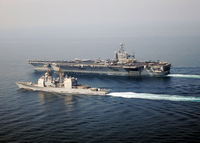The aftermath of Iran's June 12 presidential election -- and in particular, the violent repression of opposition protests -- has brought the Obama administration's stated goal of engaging with the Iranian regime into question. Even if President Barack Obama decides to follow through with efforts to engage Tehran, many observers anticipate that the Iranian leadership will take an even tougher approach to negotiations over its nuclear program.
The U.S. has not ruled out the possibility of military strikes to induce Iran to abandon its presumed goal of acquiring nuclear weapons, should diplomacy and sanctions fail. And a more recalcitrant Iranian regime may make military action seem more impelling. Such a course would not, however, advance American aims and would unwittingly hand Iran an important strategic victory.
Even as the Obama administration initially shifted U.S. policy from isolating the Tehran regime to seeking new lines of communication, it conspicuously retained the military option as a last resort. In spite of these threats, Iran has remained uncooperative with international inspectors, and has at times even been provocative. Its response to American overtures before the June 12 election was at best disappointing.

